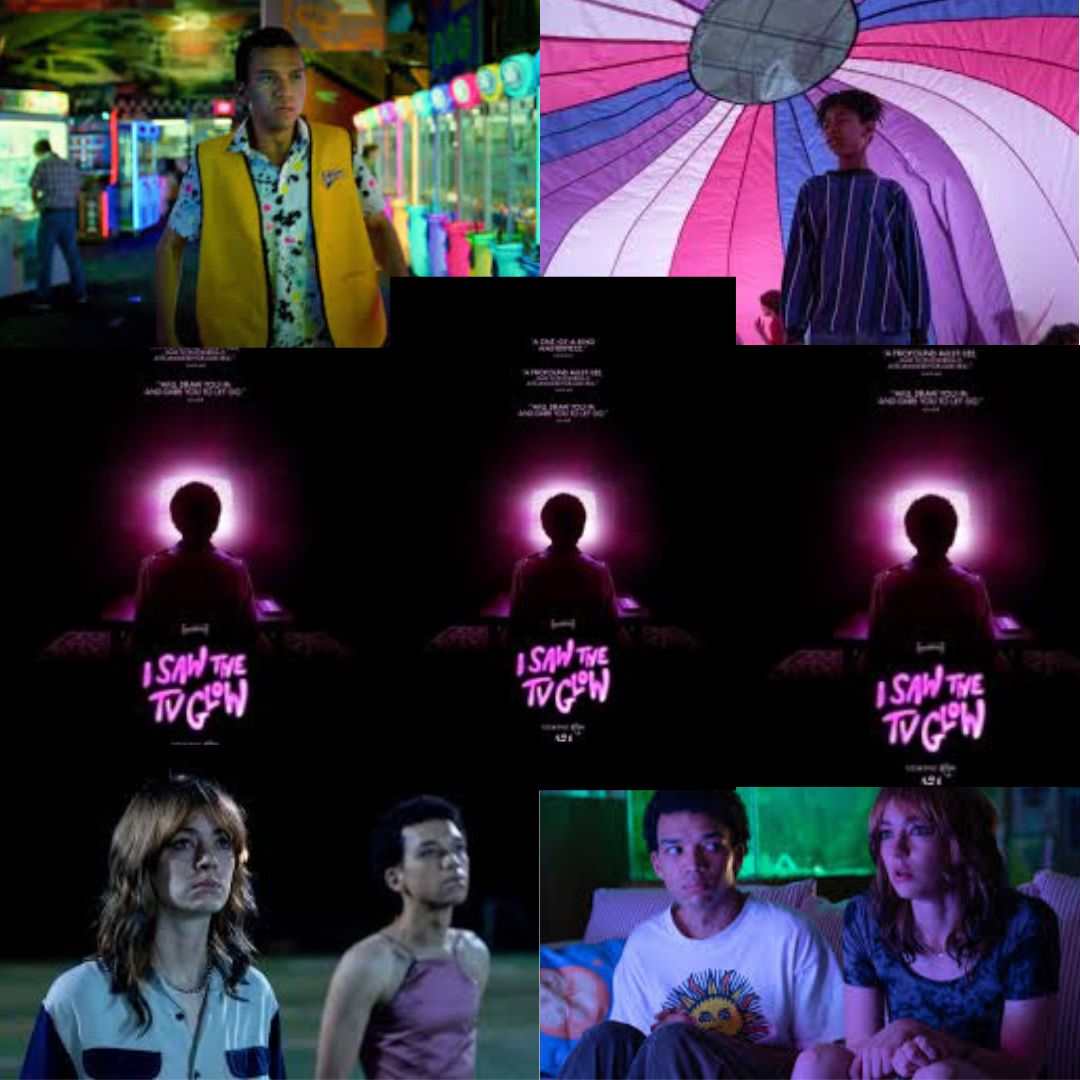Score: 4.5/5
When do we run out of time to have it “figured out”? No longer able to seize opportunities before they drift out of reach. Additionally, when does adulthood stop feeling like a costume we wear during the day?
Filmmaker Jane Schoenbrun poses these questions in their chilling coming-of-age horror I Saw the TV Glow, a new staple in queer and transgender cinema and a powerful call-to-action for anyone repressing their identities.
Nestled in a quiet, humdrum suburb, introverted teenager Owen befriends Maddy, the two bonding over their shared social reclusion and queer identities. Maddy introduces Owen to the late-night TV series “The Pink Opaque,” a clear love letter to ‘90s horror shows like Goosebumps and Are You Afraid of the Dark?
Lines between reality and the world of “The Pink Opaque” blur as Owen melts further into the static haze of the TV, culminating with Maddy’s ultimate disappearance. As years pass, Owen begins to notice the lasting effects the show had on him, impacting his identity and connection to the physical world.
Schoenbrun possesses a singular vision of contemporary storytelling. They manage to bring a sense of urgency to their film’s messages, but you’ll never notice until it sweeps you right off your feet. Their films possess an unwavering loyalty to depicting youth culture in an honest way, with a knack for encapsulating how it feels to grow up with internet culture and media as an extension of one’s identity.
If their previous film We’re All Going to the World’s Fair is a rough sketch of ideas, I Saw the TV Glow is a fully realized mural with its stunning, thoughtful visuals that evoke nostalgia the way blurry, idealistic childhood memories do.
Through lush imagery and colour choices, the film reminds us that nostalgia can be a tool for comfort, until it’s not. Snapshot memories of the TV shows you enjoyed as a kid are disinteresting; the show just seems cheesy now. The childhood snacks you once enjoyed taste too sweet nowadays. Your favourite online games are dull and unsatisfying. The friends you had in high school are occupied with their own lives, perhaps not thinking of you the way you think of them. The neighbourhood you once grew up in is now welcoming new families. It’s as if the past is telling you your time is up, that you’ve overstayed your welcome.
Regardless of what stage of life we’re at, nostalgia for simple times is a comfort that can’t technically be taken away so long as we have access to our memories, but at what point does this nostalgia become the very prison of dissatisfaction? When do the memories that gave us comfort become reminders of a life that could have been? What opportunities did we pass up out of fear? Where did it go wrong?
This fear is universal to people as beings with a library of memories, borrowing feelings from the past but never being able to own the feeling they gave us in the moment. It is, however, important and necessary to consider the queer and trans allegories used in the film.
For queer people, there’s a feeling that time is moving differently for you, that the world is moving too fast and that you don’t feel like you’ve come into your own quite yet. The coming-of-age path is non-linear and oftentimes scary, but Schoenbrun conveys that the act of self-repression can have far more scary consequences in the long run than facing who you really are.
In its sombre final act, the film veers away from messages typical to coming-of-age films. Adulthood seemingly works out in these movies one way or another, probably falling back on the trope of learning how to “embrace the mess of it all”. Schoenbrun subverts this by creating something relevant and unsettling, encapsulating the inert feeling of adulthood never truly happening inside you. It’s a depiction of numbing oneself to inner quarrels, never feeling like a grown-up in the eyes of others, despite doing everything you feel the world told you.
Yes, there is still time to comprehend your identity, but if you continuously live under self-induced repression, it will inevitably consume you alive. Days will become years, years will become decades, your life being chipped away by the fear of embracing parts of you you’ve grown afraid of. As the film puts it, “you won’t even remember that you’re dying.”
There is certainly no shortage of spooky imagery in the film, but the real horror the film centres on is existential dread. It preys on the ghosts of our repressed selves that follow us around in our day-to-day life, the memories of lives we didn’t live and the terrifying thought that it could all be our fault.
If we don’t forgive ourselves for feeling this fear, for acknowledging that it’s as integral to our identities as the memories that made us, then the grave we dig for ourselves will only be harder to escape when the dirt gets packed too tight.

